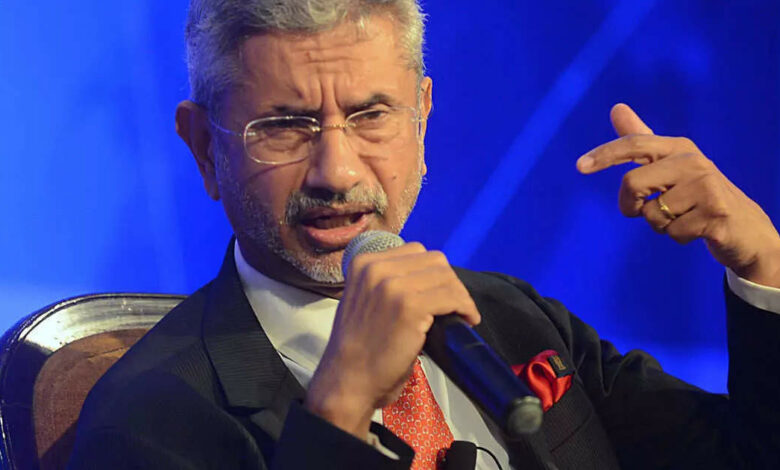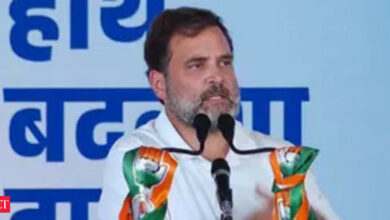ET Awards 2023: Modi’s popularity is the envy of other politicians in the world, says EAM S Jaishankar

What has changed in India and what is changing between India and the world?
Let’s take four aspects of those changes. First, the politics. The world sees an improvement in governance. It sees a Prime Minister whose popularity rating is the envy of all other politicians in the world. It sees something very rare in this century — the possibility of three successive terms in a democratic polity. That means both progress and stability.
Second, the economics. They see infrastructure change driven by Gati Shakti. It’s easier to do business. I am not sure the world is conversant with the details. But they sense 250 million people emerging from poverty, the layer above them, which is getting into a new middle class. They know there’s consumption and production increase out there.
Now, to technology. Here, there’s a big difference. People see a bigger innovation startup skilling effort. There’s an appreciation India is taking manufacturing seriously. Without that, nobody’s going to take you seriously on technology.
Finally, on the cultural side, there’s an appreciation that we are behaving differently. We speak our own metaphors, language, and think through our solutions. To me, that change has registered with the world. To round it off, this means for the world we will be more valued as a partner. It could be on big geopolitical issues, climate change and technology. Economically, an interest in bringing India into new supply chains. On the digital side, to get India more deeply integrated into a trusted transparent, digital world. So, no question, a much greater appetite for India.

Has the West adjusted to the cultural particularities of Indian democracy such as criticism of the Citizenship Amendment Act? How much of this gap is being closed as the economic conversation catches up?
When any country rises, there will be adjustments. It’s not fair to expect automatic understanding. If the rise is sharp, gaps will be more. You gave the example of CAA. In parts of the world, there’s an automatic buying into vote bank narratives. Now, nobody really figures that this is a consequence of partition. There are countries that do the same, using religion, language or other attributes as a faster pathway to citizenship or immigration. Yet, they would buy into it. So, there will be issues. What’s important is how we communicate, and set out narratives when we encounter something difficult. The rise of any country is always accompanied by argumentation and a certain marketing if you will. And that’s exactly what is happening to us.
How do you expect Indian businesses to craft their strategy on China, given the difficult geopolitical territory the government has to navigate on this front?
Before 2015-16, and I am not picking that because of the change that happened here, but also of what happened in the US, we thought of trade as a function of efficiency. Business went where it was most efficient. Fast forward to 2024 and in many domains, there’s a security layer. There are many businesses where it might be more efficient to go there but you don’t want to go because of implications, including security. Another factor is the socio-economic. The hollowing out of industry in advanced economies and the dampening of employment, and innovation in budding economies — put ourselves in that category. What does business do? In certain areas like digital, telecom, trust will be crucial. And people better wake up. Because if they make business choices, which lead them to situations where they might find themselves in difficulties, then the rest of the system will not be facilitating the execution of that choice. Now, for a lot of other stuff, here’s the problem. We can keep complaining there’s one country which accounts for 30% of manufacturing. But at some stage, we have to do something more than complain, not something they should be insensitive to.
What do you want them to do in specific terms?
Look, I am not parking it on business. We have debates where people say we shouldn’t be manufacturing. And I’m baffled. We may have missed a manufacturing period due to policies in that era. But if we have an opportunity to reboard that bus, if we can enter new industries like semiconductors, renewables, and green tech, we should. We cannot be a major power without technology. And you cannot have technology without manufacturing. It’s a very simple correlation of data we need to understand.
Do you see the India stake rising in the foreign and economic policies of other countries?
I can see it, but not yet in the definitive way you are asking. People see different parts of the puzzle. One area is skill and talent. You have countries, which are historically resistant to the movement of people, now showing interest in mobility. In global business, there’s interest in seeing some supply chains go through India, also bringing aspects of business here. It’s happening but it will take effort. We need to push more strongly. You draw a comparison with Ramayana in your book, about how every Ram needs a Lakshman.
But in a world where there are no permanent friends or enemies, only permanent interests, how do you find Lakshmans?
Literally speaking, by birth. But in diplomacy, by effort, by experience, by cultivation. One of the most underrated factors in calculating change is the sharp demographic changes in the next decade. So, if you take the realistic view, there is a value in a relationship with India. But for the Global South, we are an exemplar, a motivator, a supporter. We have this ability to be relevant to the North, to be relevant to the South, to be able to bridge the East and the West.
Source link




